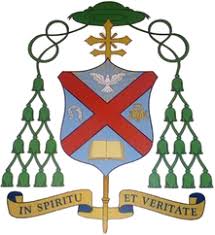The Archdiocesan Education Secretariat, in general, ensures that schools and colleges in the Archdiocese are run smoothly on behalf of the proprietor, who is the Local Ordinary. It does this by ensuring the recruitment and employment of tutors and teachers in the whole Agency for Basic and Secondary Education. It carries out administrative duties and coordinates the work of the Principals of Catholic Colleges and Managers of Catholic Nursery and Primary Schools in the Archdiocese. It has the duty of following up the teachers in Archdiocesan Schools at both the Basic and Secondary levels to ensure that proper and effective teaching goes on. The Secretariat makes a periodic report of its activities twice a year and presents it to the Archdiocesan Education Council, to the National Catholic Education Secretariat (SENECA) and to the Government. Above all, the Catholic Education Secretariat sees to it that the directives of the Ministers of Basic and Secondary Education and those of the Archdiocesan Education Council are implemented in all Catholic Schools.
The Agency runs 39 Nursery Schools and 148 Primary Schools. There are 13 Catholic Colleges in the Archdiocese of Bamenda, 5 of which are owned and run by Religious Congregations.
An important aspect in the Catholic Education programme in the Archdiocese is the Catholic Education Week – an annual celebration during which we highlight the importance of Catholic Education. It always involves a number of activities to be carried out by the pupils and students in our schools, ranging from debates, symposia, sporting activities, human investments to the closing Mass. It is usually held in November of each academic year. All our primary schools and colleges take active part in celebrating public events such as the 11th February, which is the National Youth Day, 20th May, which is the National Day, Bilingualism Week, and many others.
The financial situation of the nursery and primary schools is yet very precarious and difficult, given that the Government subsidy has witnessed a steady decrease, and has become more and more irregular. The financial difficulty of our schools has been worsened by the crisis in the Northwest and Southwest Regions of Cameroon. This makes payment of teachers very difficult. The schools usually end in huge deficits. Nevertheless, we keep the Nursery and Primary Schools for the purpose of evangelization. However, some of the colleges are doing fairly well since they run the academic year smoothly and pay the salaries of teachers.
Attending to the need of upgrading our school structures to make them more decent, modern, attractive and learning-friendly, a great transformation has been made in most of our schools in the urban areas. Giant and befitting structures have been raised as primary schools in St. John’s Parish, Foncha Street, All Saints Parish, Bayelle and St. Teresa’s Parish, Azire. Renovations have also been made to the existing school structures in the urban areas. The same spirit of improvement and renovation would have been extended to the rural areas, but that is presently impossible because of road inaccessibility brought about the crisis which has greatly affected the Archdiocese.
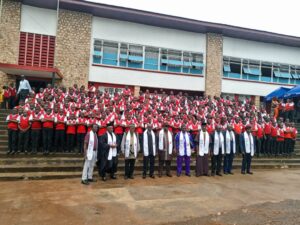
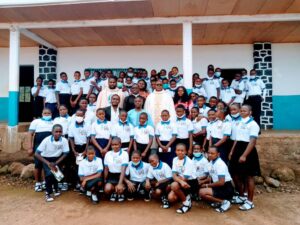
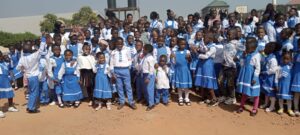
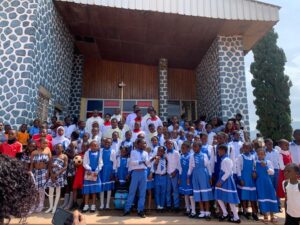
For close to two years (2017 and 2018), schools did not run in the Archdiocese Bamenda as a consequence of the armed conflict in the Northewest and Southwest Regions. However, after several appeals and negotiations, schools gradually took off amidst a tense socio-political climate. At present, however, though still facing security challenges and threats, Catholic schools in the Archdiocese have witnessed an increase in numbers, partly accounted for by the fact that many government schools are not allowed by the separatist fighters to operate.
With the ray of light given, and with the need to accommodate the growing number of students who have shown up to our Catholic colleges, four new catholic colleges have been created:
- Joseph’s College, Mankon
- All Saints Catholic College, Bayelle
- Andrew’s Technical College, Alakuma
- Our Lady Queen of Peace College, Akum
These colleges, created at the heart of Bamenda town were an attempt to rescue many of the students who escaped from colleges out of Bamenda since 2017 due to persistent kidnappings in these schools by separatist fighters who wanted school boycott as a weapon against the state in the handling of the Anglophone crisis.
These Colleges give Catholic education to children in distant and remote areas of the Archdiocese, as well as students from other dioceses of Cameroon in search of quality education. What is more, the schools have created job opportunities for many university graduates who, hitherto, roamed the towns and villages of the Archdiocese.
Below is a picture of the situation of our schools:
Nursery Schools
| Academic Year | Boys | Girls | TotalsPupils | Male Teachers | Female Teachers | TotalsTeachers |
| 2014/2015 | 507 | 538 | 1,045 | – | 46 | 46 |
| 2015/2016 | 613 | 585 | 1,198 | – | 50 | 50 |
| 2016/2017 | 612 | 761 | 1,373 | – | 42 | 42 |
| 2017/2018 | 576 | 563 | 1,138 | . | 50 | 50 |
| 2018/2019 | 581 | 595 | 1,176 | – | 45 | 45 |
| 2019/2020 | – | – | 1,461 | – | 53 | 53 |
| 202/2021 | 798 | 800 | 1,598 | – | – | – |
| 2021/2022 | 1,178 | 1,145 | 1,923 | – | – | – |
Primary Schools
| Academic Year | Boys | Girls | TotalsPupils | Male Teachers | Female Teachers | TotalsTeachers |
| 2014/2015 | 14,741 | 14,383 | 29,124 | 693 | ||
| 2015/2016 | 14,155 | 13,334 | 27,489 | 648 | ||
| 2016/2017 | 12,350 | 13,329 | 25,679 | 279 | 288 | 567 |
| 2017/2018 | 13,620 | 12,932 | 26,552 | – | – | 648 |
| 2018/2019 | 13,461 | 12,558 | 26,055 | – | – | – |
| 2019/2020 | – | – | 25,368 | – | – | 733 |
| 2020/2021 | 13,388 | 12,792 | 26,180 | – | – | – |
| 2021/2022 | 12,648 | 12,145 | 24,793 | – | – | – |
- Secondary Schools
| Academic Year | Boys | Girls | Total | Enrolment Decrease | Enrolment Increase |
| 2014/2015 | 1,578 | 2,332 | 3,910 | ||
| 2015/2016 | 1,676 | 2,500 | 4,176 | 266 | |
| 2016/2017 | 2,137 | 3,024 | 5,161 | 985 | |
| 2017/2018 | 2,379 | 3,187 | 5,566 | 454 | |
| 2018/2019 | 2,633 | 3,387 | 6,020 | 454 | |
| 2019/2020 | – | – | 6,431 | 411 | |
| 2020/2021 | 3,276 | 3,864 | 7,140 | 709 | |
| 2021/2022 | 2,919 | 3,784 | 6,703 | 437 |
